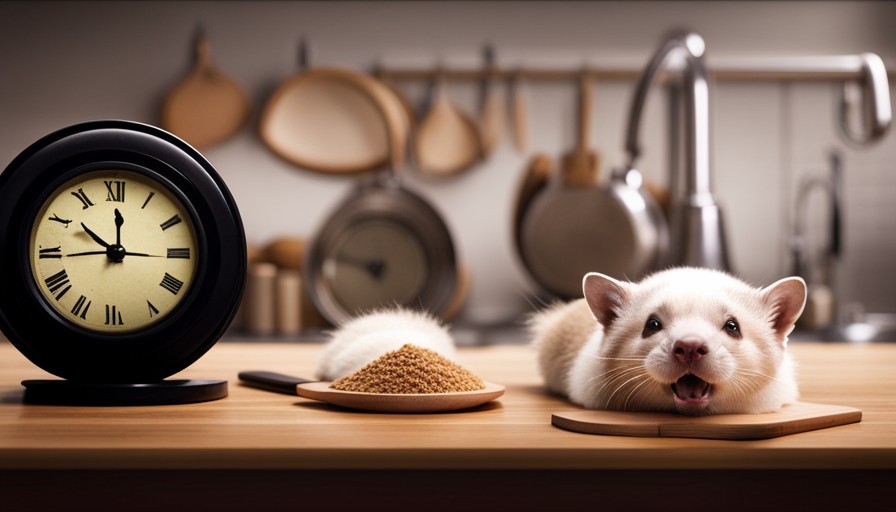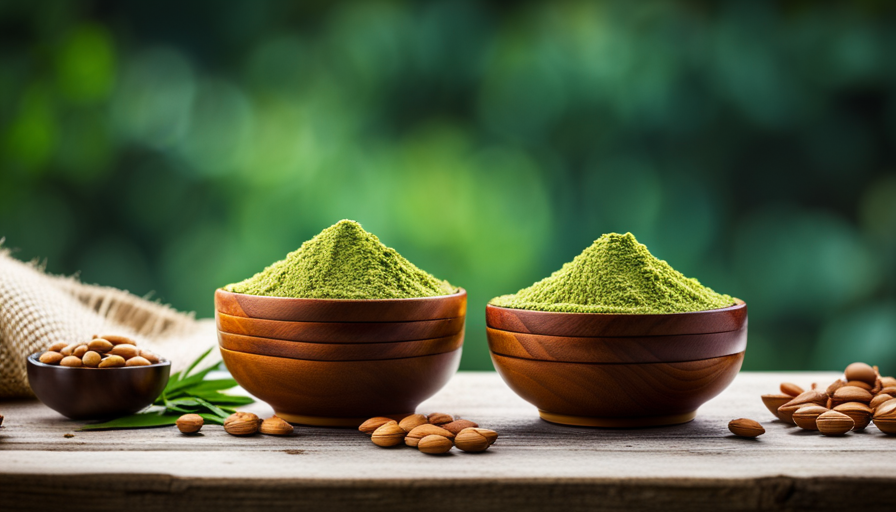I understand your concern – leaving raw food out for ferrets? Isn’t that a disaster waiting to happen? Rest assured, when it comes to our furry friends’ dietary needs, raw food is essential for their health and well-being.
But how long should we actually leave it out for them?
In this article, we will explore the ideal time frame for leaving raw food out for ferrets, along with tips on avoiding spoilage and contamination. As a proud ferret owner myself, I understand the importance of providing a balanced and nutritious diet for these curious creatures. By following the guidelines and recommendations provided here, you can ensure that your ferret is getting the most out of their raw food.
Of course, it’s always a good idea to consult with a veterinarian for specific recommendations tailored to your ferret’s needs.
So, let’s dive in and discover the best practices for feeding your ferret raw food, keeping them happy, healthy, and satisfied.
Key Takeaways
- Raw food for ferrets should be left out for no more than 30 minutes to avoid spoilage and contamination.
- Proper handling and storage techniques are important to prevent spoilage and contamination of raw food.
- Monitoring a ferret’s eating habits allows for observation of their overall health and appetite.
- Changes in eating habits or appetite may indicate underlying health issues.
Understanding Ferret Dietary Needs
Now let’s dive into what your ferret needs in their diet and why it’s so important to understand their unique dietary needs.
Ferrets have specific requirements when it comes to their food, and it’s crucial to provide them with a balanced diet that meets those needs. When it comes to choosing the right ferret food brands, it’s essential to look for ones that are specifically formulated for ferrets. These brands take into account the nutritional needs of ferrets and provide them with the necessary vitamins and minerals.
While commercial ferret food can be a good option, some ferret owners choose to transition their pets to a raw food diet. Raw food diets for ferrets consist of feeding them raw meat, bones, and organs. This type of diet mimics what ferrets would eat in the wild, and many believe that it can provide them with a more natural and nutritious diet. However, it’s important to make this transition slowly and carefully, as sudden changes in diet can upset their digestive system.
Understanding the dietary needs of your ferret is crucial for their overall health and well-being. Now, let’s explore the importance of raw food in a ferret’s diet and how it can benefit them.
The Importance of Raw Food in a Ferret’s Diet
Imagine a world where your ferret’s diet consisted only of processed pellets, devoid of the essential nutrients and enzymes found in fresh, natural ingredients. Feeding raw food to ferrets has numerous benefits that can’t be ignored.
Firstly, raw food provides a rich source of essential nutrients that are easily absorbed by your ferret’s body. It contains high levels of protein, which is crucial for their growth, muscle development, and overall health. Additionally, raw food is packed with necessary vitamins and minerals that help strengthen their immune system, ensuring they stay healthy and active.
Secondly, including raw food in your ferret’s diet helps maintain their dental health. Chewing on raw meat and bones naturally cleans their teeth, reducing the risk of dental diseases and tartar buildup.
Thirdly, feeding raw food to ferrets promotes healthy digestion. Raw food contains natural enzymes that aid in the breakdown of food, making it easier for your ferret to digest and absorb nutrients. This can prevent digestive issues such as diarrhea and constipation.
Lastly, not including raw food in a ferret’s diet can lead to potential health risks. A diet solely based on processed pellets can result in nutrient deficiencies, obesity, and a weakened immune system.
Incorporating raw food into your ferret’s diet provides numerous benefits, including improved nutrient absorption, dental health, digestion, and overall well-being. It’s vital to prioritize their health by offering them a balanced diet that includes raw food.
Now, let’s move on to discussing the ideal time frame for leaving raw food out for your ferret.
The Ideal Time Frame for Leaving Raw Food Out
Feeding your ferret a diet rich in raw, nutrient-packed ingredients ensures their overall health and well-being. But how long should you leave raw food out for your furry friend?
Raw food offers numerous benefits for ferrets, including improved digestion, increased energy levels, and a healthier coat. However, leaving raw food out for too long can pose potential health risks.
It is important to remember that raw food can spoil quickly, especially in warmer temperatures. Bacteria can multiply rapidly, leading to foodborne illnesses that can be harmful to your ferret. To avoid these risks, it’s recommended to leave raw food out for no more than 30 minutes at a time. This ensures that your ferret can consume the food while it’s still fresh and safe to eat.
By following this time frame, you can ensure that your ferret receives the maximum nutritional benefits from their raw food diet without exposing them to potential health hazards.
In the next section, we’ll explore ways to avoid spoilage and contamination of raw food, ensuring that your ferret’s meals are always safe and healthy.
Avoiding Spoilage and Contamination
To ensure your furry friend’s meals are always safe and healthy, it’s crucial to take precautions against the potential spoiling and contamination of their raw diet. Proper handling techniques and avoiding cross-contamination are essential in maintaining the freshness and quality of your ferret’s food.
Here are some tips to help you in this regard:
-
Cleanliness: Always wash your hands before and after handling raw food. This reduces the risk of transferring harmful bacteria to your ferret’s food.
-
Storage: Store raw food in airtight containers in the refrigerator or freezer to prevent spoilage. Make sure to label and date the containers for easy identification.
-
Thawing: Thaw frozen food in the refrigerator or using the defrost setting on your microwave. Avoid leaving it at room temperature as this promotes bacterial growth.
By following these guidelines, you can minimize the risk of spoilage and contamination in your ferret’s raw food. This ensures that your furry friend receives the best nutrition possible.
In the next section, we’ll discuss how to monitor your ferret’s eating habits without disrupting their mealtime routine.
Monitoring Your Ferret’s Eating Habits
Monitoring your ferret’s eating habits allows you to observe their mealtime routine and ensure they’re maintaining a healthy appetite. By keeping a close eye on their eating patterns, you can identify any changes in their behavior or appetite, which may indicate potential health concerns.
For example, if your ferret suddenly starts eating significantly less than usual or shows no interest in their food, it could be a sign of an underlying health issue that requires attention.
In addition to monitoring their overall appetite, it’s essential to pay attention to how your ferret eats their food. Some ferrets have a habit of picking at their food throughout the day, while others prefer to eat in one sitting. By understanding their eating habits, you can ensure that they’re consuming enough nutrients and adjust their feeding schedule accordingly.
While monitoring your ferret’s eating habits, it’s also crucial to observe their stool consistency and frequency. Sudden changes in their waste can be an indication of dietary issues or digestive problems. If you notice any abnormalities, it’s best to consult with a veterinarian for further guidance.
Transitioning to the subsequent section about "tips for properly storing raw food," it’s important to consider how your ferret’s eating habits can affect the storage and freshness of their food. By understanding their preferences and routine, you can ensure that you’re storing their raw food properly to avoid spoilage and contamination.
Tips for Properly Storing Raw Food
Properly storing your ferret’s raw food is essential to maintain its freshness and prevent any potential spoilage or contamination, ensuring their meals are safe and nutritious. Here are some tips for properly storing raw food for your ferret:
-
Keep raw food in the refrigerator: Raw food should always be stored in the refrigerator to slow down bacterial growth. Make sure to place it in a sealed container or wrap it tightly in plastic wrap or foil to prevent any odor or cross-contamination.
-
Separate raw food from other foods: It’s important to keep raw food separate from other foods in your refrigerator to avoid any cross-contamination. This can be done by placing the raw food on a separate shelf or in a designated area.
-
Use the food within a few days: Raw food should be used within a few days to ensure its freshness and prevent any bacterial growth. If you have leftover raw food, it’s best to discard it after a couple of days to avoid any potential health risks.
-
Thaw frozen raw food properly: If you’re using frozen raw food, make sure to thaw it properly before feeding it to your ferret. Thawing it in the refrigerator is the safest method to prevent bacterial growth.
Proper storage techniques are crucial in preventing bacterial growth and ensuring the safety of your ferret’s raw food. Now, let’s move on to the next important aspect, which is providing fresh water alongside raw food.
Providing Fresh Water Alongside Raw Food
When giving your ferret raw food, remember to always provide fresh water alongside their meal. Ferrets, like all animals, need access to clean water to stay hydrated and maintain their overall health. The temperature of the water is also important, as ferrets prefer cool water and may not drink as much if it’s too warm. Therefore, it’s best to offer them fresh, cool water in a clean bowl or water bottle.
In addition to hydration, providing fresh water alongside raw food offers several benefits. Raw food has a higher moisture content than processed kibble, but it’s still important to ensure your ferret has access to water to support digestion and prevent dehydration. Having water readily available can also help wash down any small bone or meat particles that may get stuck in their teeth or throat.
It’s important to monitor your ferret’s water intake to ensure they’re drinking enough. If you notice a decrease in their water consumption or any signs of dehydration, it’s crucial to consult with a veterinarian for specific recommendations. They can provide guidance on the appropriate amount of water to provide and any additional steps you can take to keep your ferret healthy and hydrated.
Consulting with a Veterinarian for Specific Recommendations
If you want to ensure your furry friend stays in tip-top shape, it’s a great idea to reach out to a veterinarian for personalized advice and suggestions. Consulting with a veterinarian is crucial when it comes to understanding and meeting your ferret’s dietary needs. They can provide you with specific recommendations tailored to your ferret’s individual requirements.
When discussing your ferret’s diet with a veterinarian, there are a few key points to consider:
-
Nutritional Balance: A veterinarian can help you ensure that your ferret is receiving all the necessary nutrients in their diet. They can guide you on the right balance of proteins, fats, and carbohydrates.
-
Portion Control: It’s essential to feed your ferret the correct amount of food to maintain a healthy weight. A veterinarian can advise you on portion sizes based on your ferret’s age, activity level, and overall health.
-
Food Safety: Raw food can be a great option for ferrets, but it’s essential to handle and store it correctly. A veterinarian can provide you with specific guidelines on how long to leave raw food out for your ferret and the best practices for food safety.
By consulting with a veterinarian, you can gain a better understanding of your ferret’s dietary needs and ensure you’re providing them with the best care possible. With their specific recommendations in mind, you can then move on to introducing variety in your ferret’s diet.
Introducing Variety in Your Ferret’s Diet
To keep your furry friend happy and healthy, it’s time to spice up your ferret’s meals with some exciting new flavors. While commercial ferret food is a convenient option, introducing variety in your ferret’s diet can provide them with essential nutrients and prevent boredom.
There are several ferret food types to consider, including kibble, freeze-dried raw food, and fresh raw food.
When preparing raw food for ferrets, it’s important to follow proper food safety guidelines. Start by selecting high-quality, human-grade meats such as chicken, turkey, or rabbit. Avoid seasoning or adding any additives that could be harmful to your ferret. Thoroughly wash all utensils and surfaces to prevent cross-contamination. It’s also crucial to handle raw food with clean hands and store it properly to avoid spoilage.
Introducing raw food gradually into your ferret’s diet can help them adjust to the new flavors and textures. Begin by mixing a small amount of raw food with their regular kibble, gradually increasing the ratio over time. Monitor your ferret’s response and consult with a veterinarian if you have any concerns.
Ensuring a balanced and nutritious diet for your ferret is essential for their overall health. Transitioning to a varied diet can be a great step towards achieving this goal.
Ensuring a Balanced and Nutritious Diet for Your Ferret
Now that we’ve discussed introducing variety in your ferret’s diet, let’s delve into the importance of ensuring a balanced and nutritious diet for your furry friend. As a responsible ferret owner, it’s crucial to meet their nutritional requirements to promote their overall health and well-being.
A balanced diet is essential for ferrets as it provides them with the necessary nutrients they need to thrive. Proteins should make up the majority of their diet since ferrets are obligate carnivores. High-quality, raw meat such as chicken or turkey should be the primary source of protein. Additionally, a small amount of organ meat, like liver or heart, can be included to provide essential vitamins and minerals.
To ensure a well-rounded diet, it’s vital to include other components such as bones for dental health and calcium intake, and a small amount of vegetables for fiber. Always remember that ferrets have a high metabolic rate, so frequent meals throughout the day are necessary.
To summarize, a balanced diet is crucial for your ferret’s optimal health. By providing them with the right combination of proteins, bones, and vegetables, you can meet their nutritional requirements and promote their overall well-being.
Engage your ferret’s taste buds with these fantastic options:
- Raw chicken or turkey meat
- Organ meats like liver or heart
- Bones for dental health
- A small amount of vegetables for fiber
Frequently Asked Questions
Can I leave raw food out for my ferret overnight?
Leaving raw food out overnight for my ferret is like leaving a door wide open for bacteria to come inside and cause trouble. It’s not recommended to leave raw food out for extended periods as it can spoil and become a breeding ground for harmful bacteria.
Feeding ferrets a raw food diet is beneficial, but it’s important to serve fresh food and remove any uneaten portions promptly to ensure their health and safety.
What are the signs of spoiled raw food?
When it comes to raw food for ferrets, it’s crucial to know the signs of spoiled food and how to properly store it.
Signs of spoiled raw food include a foul odor, unusual texture, and discoloration.
To ensure the safety of your ferret, always store raw food in an airtight container in the refrigerator.
Additionally, it’s important to follow the recommended guidelines for handling and storing raw food to minimize the risk of bacterial contamination and keep your ferret healthy.
How often should I monitor my ferret’s eating habits?
I monitor my ferret’s eating habits daily to ensure they’re healthy and getting the right amount of food. When it comes to feeding a ferret, it’s recommended to provide small meals throughout the day, about 4-6 times. This helps mimic their natural feeding patterns in the wild.
If you’re transitioning your ferret to a raw food diet, it’s important to do it gradually. Mix a small amount of raw food with their current diet and gradually increase the ratio over time.
Can I mix raw food with kibble in my ferret’s diet?
Yes, you can mix raw food with kibble in your ferret’s diet. It’s actually beneficial to incorporate raw food into their diet as it provides them with essential nutrients and helps mimic their natural diet in the wild. Raw food contains enzymes and amino acids that can improve their digestion and overall health. However, it’s important to ensure that the raw food is safe and properly handled to prevent any foodborne illnesses.
Are there any specific raw food items that I should avoid feeding my ferret?
When it comes to feeding my ferret raw food, I make sure to avoid certain items to ensure their safety and prevent potential allergies.
Some raw foods that I avoid feeding my ferret include onions, garlic, grapes, raisins, and chocolate. These foods can be toxic to ferrets and should be avoided.
It’s important to prioritize their health and well-being by being mindful of what we feed them. Raw food safety and potential allergies are crucial considerations when planning their diet.
Can A Raw Food Detox Be Beneficial for Ferrets?
Yes, a raw food detox process can be beneficial for ferrets. It helps to eliminate toxins, improve digestion, and boost overall health. By feeding your ferret a diet of raw, natural foods, you can support their immune system and promote a shiny, healthy coat.
Conclusion
In conclusion, it’s important to be mindful of how long raw food should be left out for our ferret companions. By understanding their dietary needs and the benefits of raw food, we can ensure a balanced and nutritious diet.
Just like a delicate dance, we must avoid leaving the food out for too long, as it can spoil and become contaminated. By monitoring our ferret’s eating habits and providing fresh water alongside their raw food, we can ensure their health and well-being.
Remember, consulting with a veterinarian for specific recommendations and introducing variety in their diet adds an extra layer of care. With these precautions in place, we can provide our furry friends with the nourishment they need to thrive.










